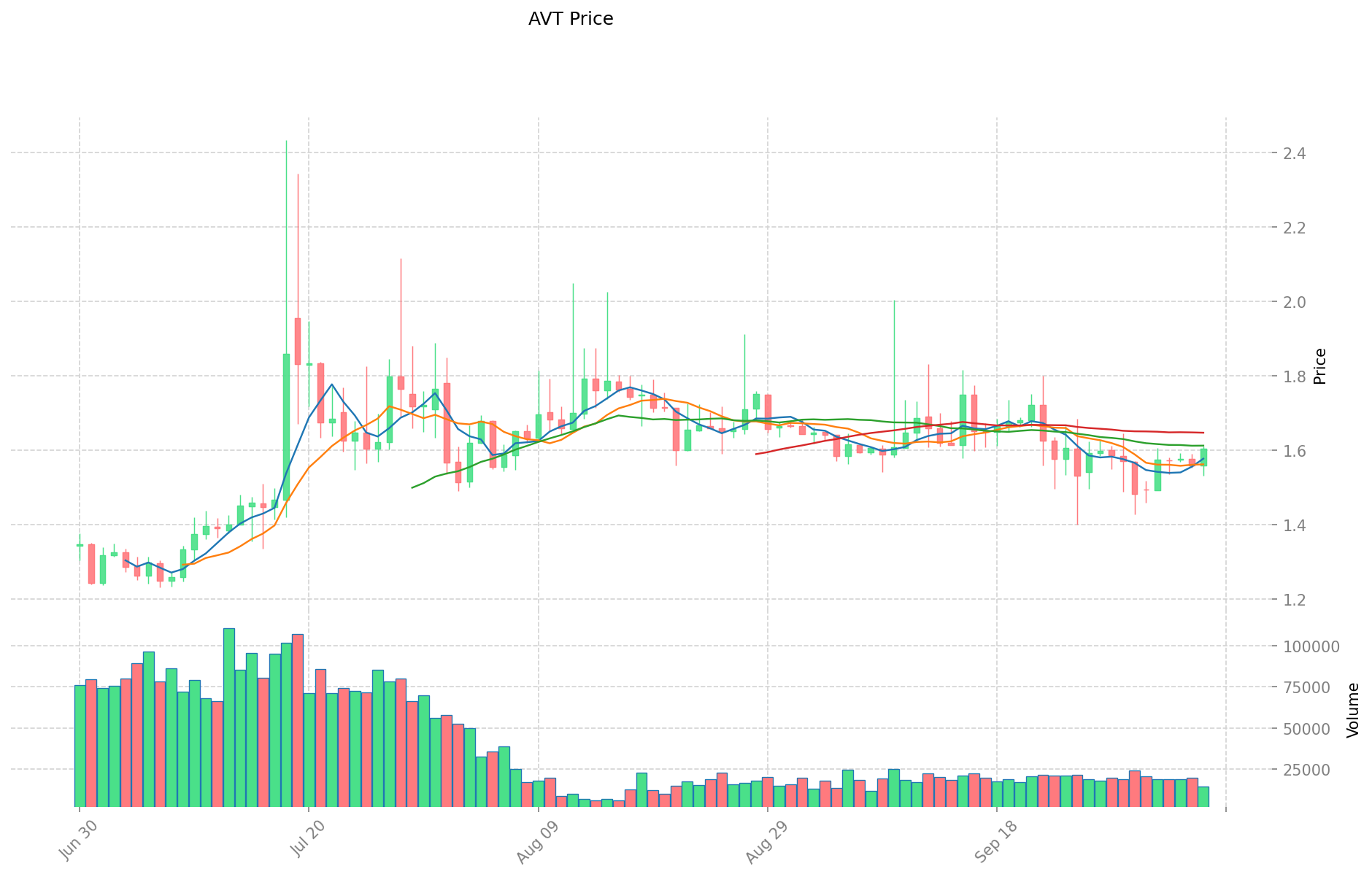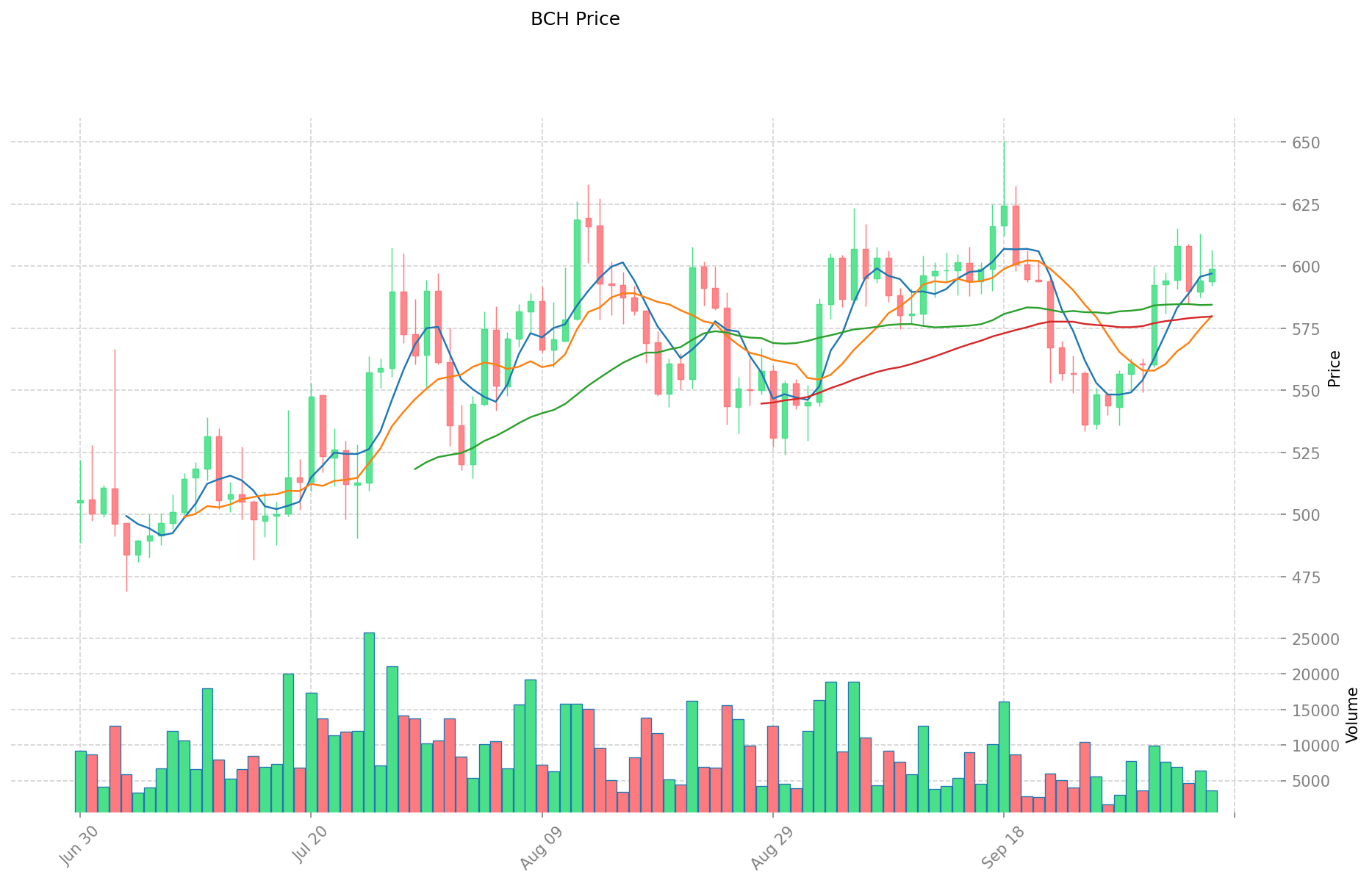AVT vs BCH: Comparing Two Digital Assets in the Evolving Cryptocurrency Landscape
Introduction: AVT vs BCH Investment Comparison
In the cryptocurrency market, the comparison between Aventus (AVT) and Bitcoin Cash (BCH) has always been a topic that investors cannot avoid. The two not only have significant differences in market cap ranking, application scenarios, and price performance, but also represent different cryptocurrency positioning.
Aventus (AVT): Since its launch in 2017, it has gained market recognition for its blockchain-based event ticketing solution that is fair, secure, and transparent.
Bitcoin Cash (BCH): Launched in 2017 as a hard fork of Bitcoin, it has been hailed as a digital payment system, and is one of the cryptocurrencies with the highest global trading volume and market capitalization.
This article will comprehensively analyze the investment value comparison between AVT and BCH, focusing on historical price trends, supply mechanisms, institutional adoption, technological ecosystems, and future predictions, and attempt to answer the question that investors are most concerned about:
"Which is the better buy right now?"
I. Price History Comparison and Current Market Status
Historical Price Trends of AVT (Coin A) and BCH (Coin B)
- 2017: BCH was created through a hard fork of Bitcoin, leading to significant price volatility.
- 2020: AVT launched its mainnet, resulting in increased market attention and price appreciation.
- Comparative analysis: During the 2021 bull market, AVT reached an all-time high of $10.25, while BCH peaked at $3,785.82 in December 2017.
Current Market Situation (2025-10-07)
- AVT current price: $1.604
- BCH current price: $599.93
- 24-hour trading volume: AVT $22,110.37 vs BCH $2,130,659.26
- Market sentiment index (Fear & Greed Index): 71 (Greed)
Click to view real-time prices:
- Check AVT current price Market Price
- Check BCH current price Market Price


Factors Affecting AVT vs BCH Investment Value
Supply Mechanism Comparison (Tokenomics)
- Bitcoin Cash (BCH): Follows Bitcoin's halving mechanism, with a maximum supply cap of 21 million coins
- AVT: Limited information available in the provided materials
- 📌 Historical Pattern: The halving mechanism in BCH tends to create cyclical price movements similar to Bitcoin, potentially creating scarcity-driven value over time.
Institutional Adoption and Market Applications
- Institutional Holdings: Limited information in the provided materials
- Enterprise Adoption: BCH offers advantages for cross-border payments with lower transaction fees and faster processing compared to Bitcoin
- Regulatory Attitudes: Varying regulatory approaches across countries, with some embracing cryptocurrency adoption while others implementing stricter limitations
Technical Development and Ecosystem Building
- BCH Technical Development: Implementation of smart contract functionality in 2021; larger block size (compared to Bitcoin) enabling more transactions per block and reducing fees
- Ecosystem Comparison: BCH demonstrates practical applications in commercial payments, cross-border remittances, and digital asset storage
Macroeconomic Factors and Market Cycles
- Inflation Environment Performance: BCH shares some characteristics with Bitcoin as a potential hedge against inflation due to its fixed supply cap
- Macroeconomic Monetary Policy: Interest rates and USD index fluctuations likely impact cryptocurrency valuations including BCH
- Geopolitical Factors: BCH's borderless nature enables global transactions without additional fees, potentially valuable in unstable financial systems
III. 2025-2030 Price Prediction: AVT vs BCH
Short-term Prediction (2025)
- AVT: Conservative $0.89 - $1.60 | Optimistic $1.60 - $2.18
- BCH: Conservative $383.30 - $598.92 | Optimistic $598.92 - $700.73
Mid-term Prediction (2027)
- AVT may enter a growth phase, with prices expected in the range of $1.20 - $2.92
- BCH may enter a steady growth phase, with prices expected in the range of $643.49 - $900.88
- Key drivers: Institutional inflows, ETFs, ecosystem development
Long-term Prediction (2030)
- AVT: Base scenario $2.59 - $3.46 | Optimistic scenario $3.46 - $4.08
- BCH: Base scenario $864.42 - $971.26 | Optimistic scenario $971.26 - $1,418.04
Disclaimer: This prediction is based on historical data and market trends. Cryptocurrency markets are highly volatile and subject to change. This information should not be considered as financial advice. Always conduct your own research before making investment decisions.
AVT:
| 年份 | 预测最高价 | 预测平均价格 | 预测最低价 | 涨跌幅 |
|---|---|---|---|---|
| 2025 | 2.18008 | 1.603 | 0.89768 | 0 |
| 2026 | 2.3455096 | 1.89154 | 1.2862472 | 17 |
| 2027 | 2.923564224 | 2.1185248 | 1.207559136 | 32 |
| 2028 | 3.4034100912 | 2.521044512 | 1.31094314624 | 57 |
| 2029 | 3.969384584144 | 2.9622273016 | 2.36978184128 | 84 |
| 2030 | 4.08965101258896 | 3.465805942872 | 2.599354457154 | 116 |
BCH:
| 年份 | 预测最高价 | 预测平均价格 | 预测最低价 | 涨跌幅 |
|---|---|---|---|---|
| 2025 | 700.7364 | 598.92 | 383.3088 | 0 |
| 2026 | 864.271506 | 649.8282 | 409.391766 | 8 |
| 2027 | 900.88932507 | 757.049853 | 643.49237505 | 26 |
| 2028 | 945.0253314999 | 828.969589035 | 787.52110958325 | 38 |
| 2029 | 1055.5269777182655 | 886.99746026745 | 718.4679428166345 | 47 |
| 2030 | 1418.042839729572315 | 971.26221899285775 | 864.423374903643397 | 61 |
IV. Investment Strategy Comparison: AVT vs BCH
Long-term vs Short-term Investment Strategies
- AVT: Suitable for investors focused on niche markets and potential ecosystem growth
- BCH: Suitable for investors seeking established networks and potential inflation hedge
Risk Management and Asset Allocation
- Conservative investors: AVT: 10% vs BCH: 90%
- Aggressive investors: AVT: 30% vs BCH: 70%
- Hedging tools: Stablecoin allocation, options, cross-currency portfolios
V. Potential Risk Comparison
Market Risk
- AVT: Higher volatility due to lower market cap and trading volume
- BCH: Susceptible to broader crypto market trends and Bitcoin price movements
Technical Risk
- AVT: Scalability, network stability
- BCH: Mining concentration, potential security vulnerabilities
Regulatory Risk
- Global regulatory policies may have different impacts on both coins
VI. Conclusion: Which Is the Better Buy?
📌 Investment Value Summary:
- AVT advantages: Niche market focus, potential for ecosystem growth
- BCH advantages: Established network, larger market cap, potential as digital payment system
✅ Investment Advice:
- Novice investors: Consider a small allocation to BCH for exposure to established cryptocurrencies
- Experienced investors: Diversify with a mix of both, adjusting based on risk tolerance
- Institutional investors: Conduct thorough due diligence, consider BCH for larger allocations due to higher liquidity
⚠️ Risk Warning: Cryptocurrency markets are highly volatile. This article does not constitute investment advice. None
FAQ
Q1: What are the key differences between AVT and BCH? A: AVT is focused on blockchain-based event ticketing, while BCH is a digital payment system derived from Bitcoin. BCH has a larger market cap, higher trading volume, and more established network compared to AVT.
Q2: How do the current prices and market caps of AVT and BCH compare? A: As of 2025-10-07, AVT's price is $1.604, while BCH's price is $599.93. BCH has a significantly higher market cap and 24-hour trading volume compared to AVT.
Q3: What are the main factors affecting the investment value of AVT and BCH? A: Key factors include supply mechanisms, institutional adoption, technical development, ecosystem building, and macroeconomic factors such as inflation and geopolitical events.
Q4: How do the price predictions for AVT and BCH differ for 2030? A: For 2030, AVT's base scenario predicts a range of $2.59 - $3.46, with an optimistic scenario of $3.46 - $4.08. BCH's base scenario predicts $864.42 - $971.26, with an optimistic scenario of $971.26 - $1,418.04.
Q5: What are the recommended investment strategies for AVT and BCH? A: For conservative investors, a suggested allocation is 10% AVT and 90% BCH. For aggressive investors, the recommendation is 30% AVT and 70% BCH. Diversification and risk management are key for both strategies.
Q6: What are the main risks associated with investing in AVT and BCH? A: Risks include market volatility, technical challenges such as scalability and security, and potential regulatory changes that could impact both cryptocurrencies differently.
Q7: Which cryptocurrency might be better for different types of investors? A: Novice investors might consider a small allocation to BCH for exposure to established cryptocurrencies. Experienced investors could diversify with both AVT and BCH. Institutional investors might lean towards BCH for larger allocations due to higher liquidity, but should conduct thorough due diligence.
Share
Content